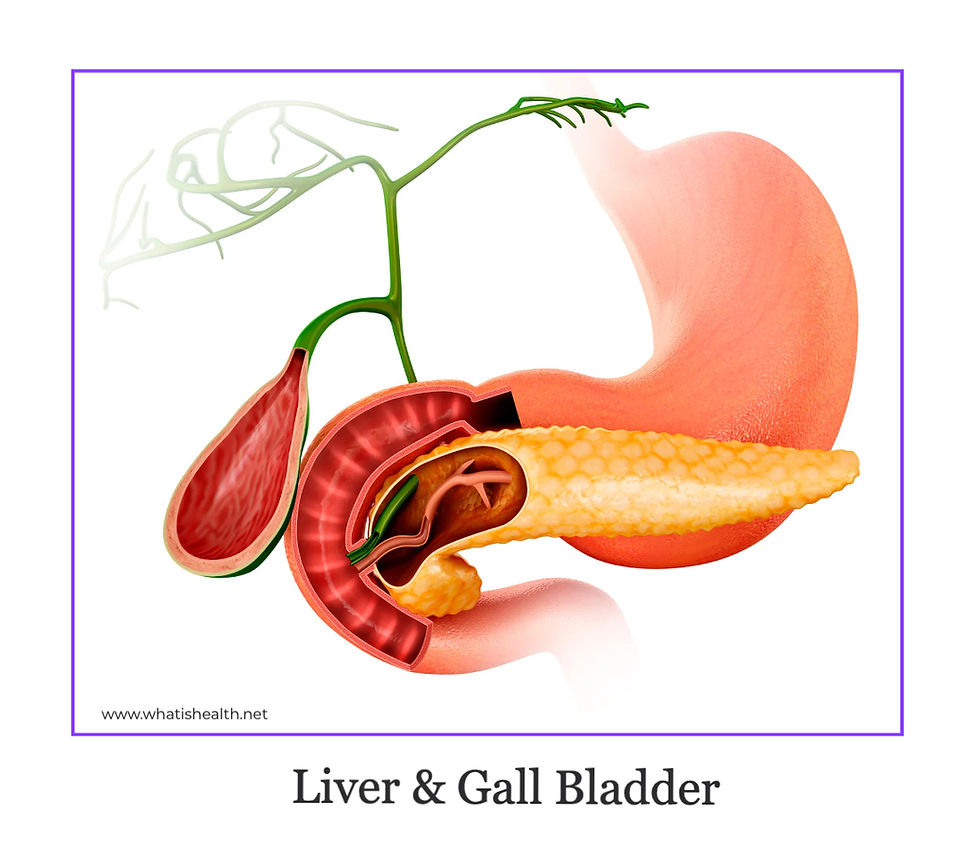Struggling with Digestion, Nausea and Fatigue? Here’s Why Bile Flow Could Be the Missing Piece
- Marnie
- Sep 24, 2024
- 4 min read
Have you ever experienced nausea, constipation, or fatigue, and no matter what you tried, you couldn’t get to the bottom of it? These symptoms are common, yet often misunderstood or maybe even considered normal to some as they can come and go or linger over periods of time. As a functional nutritionist, I work with many clients who come to me after months or even years of feeling off, but not knowing why. Often, the culprit is something that gets overlooked: bile stagnation due to gallbladder, liver, and even stress-related cortisol issues.

A Client Story: Connecting the Dots
One of my clients, Mary Ann, came to me frustrated and exhausted. She had been dealing with nausea after meals, frequent bouts of constipation, often stool that was floating (which is a sign of fat in the stool), and a general feeling of fatigue that no doctor seemed able to pinpoint. She had gone through numerous tests and tried various medications and dietary changes, but nothing made a significant difference. When she came to me, her primary concern was finding the cause of these troubling symptoms.
Because I have been trained to understand the intricate connections between the digestive system and overall health, I began to ask her about her diet, stress levels, and overall digestive function. Through my functional nutrition approach, I suspected a gallbladder and liver issue—particularly bile stasis, or stagnant bile flow. Upon further functional laboratory testing and analysis, my suspicion was confirmed. Her liver and gallbladder were struggling to produce and move bile efficiently, and stress was a significant contributor.
What is Bile, and Why Does It Matter?

The gallbladder may be small, but it plays a mighty role in your digestive system. It stores and concentrates bile, a substance produced by the liver.
Bile is essential for:
Digesting Fats: It helps break down fats into smaller molecules, making them easier for your body to absorb.
Absorbing Nutrients: Fat-soluble vitamins like A, D, E, and K need bile for absorption.
Eliminating Waste: Bile carries waste products, like bilirubin and excess cholesterol, from the liver into the digestive tract for elimination.
Detoxification: Bile helps flush out toxins from the liver, keeping your body clean and healthy.
However, when bile becomes stagnant—meaning it doesn’t flow properly through the digestive system—it can lead to a host of issues. Stagnant bile can thicken and cause gallstones, constipation, and malabsorption of fats and fat-soluble vitamins. Additionally, when bile isn’t flowing efficiently, toxins meant to be eliminated through bile build up in the body, leading to symptoms like fatigue, brain fog, and hormonal imbalances.
Symptoms of Stagnant Bile to Watch For:
Nausea after meals, especially after eating fatty foods.
Constipation or sluggish digestion, and can often be accompanied by floating stool, as well as stool that is greasy (all signs that fat is not being digested)
Fatigue and feeling rundown without a clear cause.
Bloating or discomfort after eating.
Skin issues or a yellowish tint, sometimes indicating a buildup of bilirubin.
Sound familiar? If you’re nodding your head, it’s possible that bile stagnation could be the missing link.
Why Does Bile Become Stagnant?
Several factors can contribute to sluggish bile flow, including:
Poor Diet: Processed foods, high sugar, and unhealthy fats can impede bile production.
Low-Fat Diets: Ironically, eating too little fat can also reduce the need for bile, slowing its flow.
Lack of Fiber: Fiber binds to bile salts, helping stimulate bile flow and elimination.
Hormonal Imbalances: Particularly high estrogen levels can slow bile flow.
Stress: Chronic stress activates the sympathetic nervous system, slowing down digestive functions, including bile production. High cortisol levels can affect the liver’s ability to produce and detoxify bile effectively.
Dehydration: Without enough water, bile thickens and can’t move freely. Another reason why I am a big proponent of LMNT, a great way to stay hydrated!
How Cortisol Affects Digestion: The Stress-Bile Connection:
Stress plays a larger role in bile stagnation than many people realize. When you’re under stress, your body enters a fight-or-flight state, prioritizing immediate survival over long-term health. This means digestive processes slow down or even stop, including bile production. Over time, if stress is not managed, cortisol—the stress hormone—can inhibit liver function, contributing to sluggish bile flow and impairing detoxification.
In Mary Anne's case, high stress levels were a major factor in her symptoms. She was juggling work, family, and health concerns, all while her body struggled to produce and move bile effectively. Once we began addressing her stress levels and supporting her gallbladder and liver function through dietary changes, supplement additions, and lifestyle shifts, she started to feel better. Her nausea decreased, her digestion improved, and she finally had more energy.
Getting to the Root Cause: How I Can Help
If you’re experiencing symptoms like nausea, constipation, or fatigue and haven’t found relief, it’s time to look deeper. As a functional nutritionist, I take a full-body approach to health by examining the body’s interconnected systems. The liver, gallbladder, and stress response are all part of a delicate balance that, when disrupted, can lead to bile stagnation and a host of other issues. By focusing on diet, lifestyle changes, and stress management, we can get your digestive system back on track.
If this sounds familiar and you think stagnant bile may be an issue for you, it’s important to address it before it leads to more serious complications like gallstones, nutrient deficiencies, or toxin buildup. By optimizing your diet, managing stress, and supporting your liver and gallbladder, you can restore balance to your digestive system and start feeling like yourself again.
Feel free to reach out if you want to dive deeper into the root cause of your health symptoms. Together, we can create a plan tailored to your specific needs.







Comments